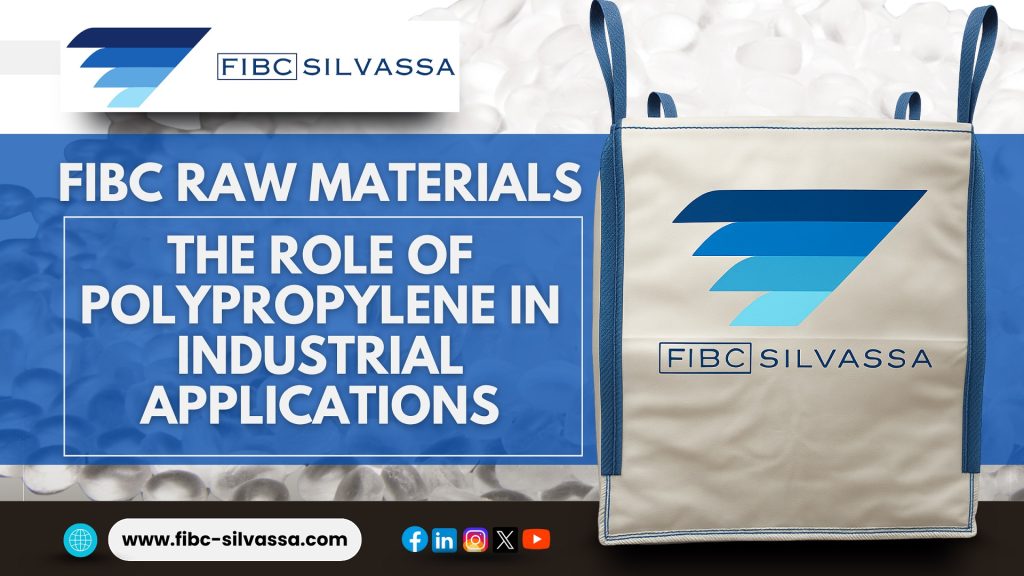
FIBC Raw Materials, especially polypropylene, determine the strength, durability, and versatility of bulk bags used across industries. Therefore, manufacturers rely on polypropylene to produce flexible intermediate bulk containers (FIBCs) that safely store and transport materials such as food, chemicals, and construction products. Moreover, industries achieve better reliability and safety in handling bulk goods through the use of high-quality FIBC raw materials.
Understanding FIBC Raw Materials
The main FIBC raw material is polypropylene, a thermoplastic polymer known for its strength, flexibility, and chemical resistance. In addition, weaving polypropylene into fabric produces a material that supports heavy loads while remaining lightweight.
Other components include:
- Additives – UV stabilizers and anti-static agents enhance durability.
- Liners – Polyethylene liners protect materials from moisture.
- Threads and Tapes – Polypropylene or polyester threads secure seams and reinforce structure.
FIBC Raw Materials : The Essential Role of Polypropylene in FIBCs
Polypropylene provides the backbone for FIBCs. As a result, bags gain the strength and resistance needed for industrial use.
Key advantages include:
- High tensile strength – Supports heavy loads safely.
- Moisture resistance – Maintains integrity under humid conditions.
- UV protection – Withstands sunlight exposure when treated.
- Chemical stability – Handles acids, alkalis, and other chemicals.
- Food-grade safety – FDA-approved for direct food contact.
Specialized Treatments for Different Applications
Manufacturers modify polypropylene to meet different industrial needs. For example:
- UV-Stabilized FIBCs – Ideal for outdoor storage.
- Anti-Static FIBCs (Type B, C, D) – Prevent static discharge in flammable environments.
- Moisture-Proof FIBCs – Include liners for sensitive materials.
- Conductive & Dissipative FIBCs – Ensure safe handling of powders and chemicals.
Industrial Uses of FIBCs Across Different Sectors
1. Food and Beverages
Therefore, companies use polypropylene FIBCs to store and transport bulk food items like sugar, flour, rice, and spices safely and efficiently.
2. Agriculture
Additionally, FIBCs made from quality polypropylene help transport seeds, grains, fertilizers, and animal feed efficiently.
3. Construction
Strong polypropylene FIBCs safely carry heavy materials such as sand, gravel, and cement.
4. Chemicals and Minerals
In addition, chemical and mineral industries depend on anti-static and conductive polypropylene FIBCs to ensure the safe handling of powders and reactive materials.
Sustainability of FIBC Raw Materials
Polypropylene is fully recyclable. Moreover, industries can reuse polypropylene from old FIBCs to produce new materials, reducing waste and supporting eco-friendly packaging practices.
Conclusion: Why Polypropylene FIBCs Are the Best Choice
As a result, using high-quality FIBC raw materials like polypropylene helps industries achieve greater safety, durability, and sustainability in every stage of bulk handling. In summary, from food and agriculture to construction and chemicals, polypropylene-based FIBCs provide reliable solutions for bulk storage and transport. With a strong export presence across major countries such as the USA, Canada, Germany, the UAE, Australia, South Africa, Brazil, the UK, Saudi Arabia, and Türkiye, FIBC Silvassa continues to deliver premium-quality, long-lasting, and globally trusted FIBC solutions to industries worldwide.
